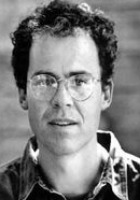Jeffrey Harrison Biography
Jeffrey W. Harrison is an American poet. His most recent poetry collection is The Names of Things: New & Selected Poems (The Wayweiser Press, 2006). His poems have appeared in literary journals and magazines including The New Republic, The New Yorker, The Paris Review, Poetry, The Yale Review, Poets of the New Century. His honors include Pushcart Prizes, Guggenheim, National Endowment for the Arts, and Amy Lowell Traveling fellowships. He has taught at George Washington University, Phillips Academy, and College of the Holy Cross. He is currently on the faculty of the Stonecoast MFA Program at the University of Southern Maine. He lives in Dover, Massachusetts.
Honors and awards
The Singing Underneath selected by James Merrill for the National Poetry Series,
1999 Guggenheim Fellowship
National Endowment for the Arts
two Pushcart Prizes
1988-1989 Amy Lowell Poetry Travelling Scholarship
Lavan Younger Poets Award from the Academy of American Poets.
had less to do
with any harm
they might inflict
than with the sad
...
It's a motley lot. A few still stand
at attention like sentries at the ends
of their driveways, but more lean
askance as if they'd just received a blow
to the head, and in fact they've received
many, all winter, from jets of wet snow
shooting off the curved, tapered blade
of the plow. Some look wobbly, cocked
at oddball angles or slumping forlornly
on precariously listing posts. One box
bows steeply forward, as if in disgrace, its door
lolling sideways, unhinged. Others are dented,
battered, streaked with rust, bandaged in duct tape,
crisscrossed with clothesline or bungee cords.
A few lie abashed in remnants of the very snow
that knocked them from their perches.
Another is wedged in the crook of a tree
like a birdhouse, its post shattered nearby.
I almost feel sorry for them, worn out
by the long winter, off-kilter, not knowing
what hit them, trying to hold themselves
together, as they wait for news from spring.
...
It wasn't until we got the Christmas tree
into the house and up on the stand
that our daughter discovered a small bird's nest
tucked among its needled branches.
Amazing, that the nest had made it
all the way from Nova Scotia on a truck
mashed together with hundreds of other trees
without being dislodged or crushed.
And now it made the tree feel wilder,
a balsam fir growing in our living room,
as though at any moment a bird might flutter
through the house and return to the nest.
And yet, because we'd brought the tree indoors,
we'd turned the nest into the first ornament.
So we wound the tree with strings of lights,
draped it with strands of red beads,
and added the other ornaments, then dropped
two small brass bells into the nest, like eggs
containing music, and hung a painted goldfinch
from the branch above, as if to keep them warm.
...
Walking past the open window, she is surprised
by the song of the white-throated sparrow
and stops to listen. She has been thinking of
the dead ones she loves- her father who lived
over a century, and her oldest son, suddenly gone
at forty-seven- and she can't help thinking
she has called them back, that they are calling her
in the voices of these birds passing through Ohio
on their spring migration. . . because, after years
of summers in upstate New York, the white-throat
has become something like the family bird.
Her father used to stop whatever he was doing
and point out its clear, whistling song. She hears it
again: 'Poor Sam Peabody Peabody Peabody.'
She tries not to think, 'Poor Andy,' but she
has already thought it, and now she is weeping.
But then she hears another, so clear, it's as if
the bird were in the room with her, or in her head,
telling her that everything will be all right.
She cannot see them from her second-story window-
they are hidden in the new leaves of the old maple,
or behind the white blossoms of the dogwood-
but she stands and listens, knowing they will stay
for only a few days before moving on.
...
